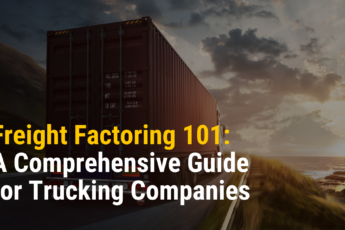For trucking companies, the right vendor partnerships can make all the difference. The right vendors can provide crucial services and support that can improve both productivity and profitability while streamlining processes and reducing some of the stress that comes with running a business in a volatile industry. Here are some of the key vendors trucking companies can lean on to help them find success.
What Types of Vendors Might Trucking Companies Utilize?
Fuel Suppliers
We’ll kick off this list with fuel suppliers. Obviously trucks need fuel, and fuel costs account for a large portion of operational costs for trucking companies, with smaller trucking companies paying higher rates for fuel than larger companies thanks to the economies of scale. Partnering with a fuel vendor can help companies gain access to a steady supply and competitive pricing.There are plenty of other ways to save on fuel, such as training drivers to operate their trucks more efficiently and utilizing fuel card programs like those offered by Express Freight Finance, which can be used at more than 6,800 truck stops across the US and offer savings of up to $1. Call us at 877.697.0605 to learn more about our fuel card program.
Maintenance and Repair Service Providers
Trucking companies need to be able to trust the maintenance and repair service providers they use since their equipment is critical to earning money. A great partnership here can ensure a company’s fleet stays in optimal condition, improving fuel efficiency and helping to avoid large costly repairs in the long run.
Equipment Dealers
At some point, every trucking company, whether they’re a single truck owner-operator or a large trucking outfit, will need new equipment. Building a partnership with an equipment dealer before that day comes can help trucking companies get a better deal on new equipment, whether that’s a new or used truck, a new dry van, or perhaps a flatbed or reefer trailer to expand service offerings. Express Freight Finance also offers equipment leasing to help you grow your fleet or replace aging equipment. Check out more information on our leasing program and find the application here.
Financial Institutions
Every business needs a bank, and trucking companies tend to fare best with banks that specialize or at least have some experience in the trucking industry. Patronizing a bank that understands business needs in trucking gives companies access to banking services, lines of credit, equipment financing, and other financial services that they may need to optimize business.
Freight Factoring Companies
Not every trucking company uses freight factoring, but it can be a valuable service in their arsenal if they carefully select the right freight factoring partner, improving cash flow through faster payments and streamlining operations by outsourcing the burden of collections to the factoring company.Express Freight Finance offers both traditional factoring and Instant Pay, a new service that allows trucking companies to get paid even faster. Considering changing your freight factoring company or signing up with a freight factoring company? Reach out to our team here to learn more.
Insurance Providers
Insurance is a critical service that all trucking companies need, and building a great relationship with your insurance provider can go a long way toward ensuring you’re getting the right policies at the right price. Be sure to explore potential discounts that other service providers may be able to offer. For example, Express Freight Finance has partnerships with insurance companies to help our customers get the best possible rates on their comprehensive and cargo insurance policies.
Technology Solution Providers
Like it or not, technology is a staple in the modern trucking industry, and trucking companies will need at least some technology to get by these days. Tech solutions like telematics systems and fleet management tools can enhance efficiency, optimize routes, track fuel usage, automate tasks, and improve overall operations. Market data tools like Express Freight Finance’s MarketFIT help companies find opportunities to grow, and apps like the EFF360 app can be used to streamline tasks like invoice processing and payment management.
Dispatch Software Providers or Dispatching Services
Drivers must be dispatched on loads, so most trucking companies use either dispatch software or a dispatching service. Dispatch software can enable trucking companies to manage load assignments, optimize routes, and track shipments in real time, whereas a dispatching service uses its own software to carry out similar tasks. Though this type of technology or service isn’t strictly necessary, there are countless benefits to using dispatching software, including improved efficiency, increased productivity, and better customer service.
Load Boards or Other Freight Marketplaces
Partnering with reputable load boards, freight marketplaces, and digital freight matching services can help trucking companies access a wide range of available loads. These platforms facilitate efficient load matching, optimize fleet utilization, and expand business opportunities by helping carriers establish relationships with shippers and brokers. Express Freight Finance clients can get premium load board access through our partnership with Direct Freight. Reach out to our team at 877.697.0605 for details.
Compliance and Regulatory Services
There’s a lot of red tape in the trucking industry, and many trucking companies choose to hire compliance and regulatory service providers to help them cut through it and ensure everything is in order. These partners help with licensing, permits, and compliance requirements, ensuring adherence to legal standards and avoiding penalties. This is a great idea since non-compliance can be very costly in terms of both fines and fees as well as negative impacts on reputation.
In Conclusion
There’s not a lot of room for a thriving one-man show in the modern trucking industry. Partnerships are critical to building and maintaining successful, profitable trucking companies. The right partnerships can streamline operations, cut operating costs, improve profitability, and open opportunities for new business.






